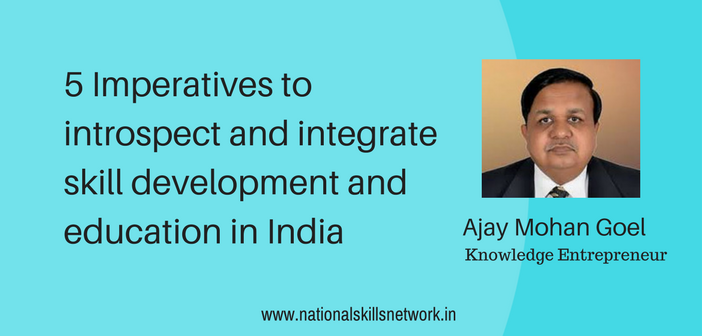In this guest article, Ajay Mohan Goel, Principal Consultant at Skills Management Group, discusses pertinent issues for the success of skill development and vocational education in India. He emphasises on the need to reflect on various initiatives from MHRD and UGC and review the same in the light of schemes under Skill India Mission for effective coordination, integration and accountability. Let’s read on to introspect and understand his insights.
A relatively little known author Jospeh Ohler, Jr has said, “one can earn a thousand credentials but remain unemployed.” We are aware of the high dropout rates in high schools and the low employability quotient of our graduates. With sixteen years behind us in this millennium and thirty years, after the emphasis placed on vocationalisation of education in the National Education Policy 1986, where do we stand now in terms of policy framework and its execution? Isn’t it the most appropriate time to introspect? First, let us review the developments of previous five years in both school as well as in higher education.
 In 2011, Ministry of Human Resources Development (MHRD) released the “Scheme for Vocationalisation of Higher Secondary Education.” Implementation started in 2012 with the successful pilot implementation in 40 government schools in Haryana. Now over 6,000 government schools offer a choice of vocational subjects, aligned with National Skills Qualifications Framework (NSQF) from Class 9 to class 12. While the design of the scheme and the first three years saw good execution in the states of Himachal Pradesh and Haryana, the implementation has started showing signs of floundering. Significant proportion of these schools have not set up the vocational training labs and almost all of them have completely outsourced the trainers to private training providers and are grossly under paid. The State Education Boards, with some exceptions, have not taken the ownership of seamlessly integrating the vocational subjects, their assessments and certifications. This places an urgent need for quality monitoring mechanisms, both at state and MHRD level.
In 2011, Ministry of Human Resources Development (MHRD) released the “Scheme for Vocationalisation of Higher Secondary Education.” Implementation started in 2012 with the successful pilot implementation in 40 government schools in Haryana. Now over 6,000 government schools offer a choice of vocational subjects, aligned with National Skills Qualifications Framework (NSQF) from Class 9 to class 12. While the design of the scheme and the first three years saw good execution in the states of Himachal Pradesh and Haryana, the implementation has started showing signs of floundering. Significant proportion of these schools have not set up the vocational training labs and almost all of them have completely outsourced the trainers to private training providers and are grossly under paid. The State Education Boards, with some exceptions, have not taken the ownership of seamlessly integrating the vocational subjects, their assessments and certifications. This places an urgent need for quality monitoring mechanisms, both at state and MHRD level.
Why MHRD should take the first step to introspect and integrate?
What is needed now is for MHRD to take stock of implementation of various schemes in vocational education and evaluate what works and what doesn’t. Only then, we can move ahead by adopting a midcourse correction action-plan as per current needs, particularly after the launch of Skill India mission by MSDE. If this is not done, one of the objectives of National Policy for Skill Development and Entrepreneurship, to “integrate skilling with formal education in 25% schools from class 9 onwards, over the next 5 years, to make skill development aspirational,” will remain only on paper in the year 2020.
Over 80% of organised sector jobs need one to two years of full time focused studies, post 12th class. With this in mind, University Grants Commission (UGC) had released the “Community College Scheme” in 2013, which offered courses of 6 to 24 months’ duration, integrated into the formal structure of higher education, with a provision for upward mobility. Subsequently in 2014 UGC came up with the “Scheme for Bachelor in Vocation” (B.Voc.). Subsequently a third scheme called “Deen Dayal Upadhyay – Kaushal Kendras”, for establishing full-fledged skill departments within universities and colleges, was created, which offers masters and doctoral level programs also in addition to B.Voc. Over 400 colleges have been selected and funded by UGC for Community College and B.Voc. scheme, and 64 institutions for Kaushal Kendras.
Apparently, the execution and implementation of these schemes needs to be relooked at. For instance, UGC should introspect on the process of funding, time taken to approve the funds and the need for an expert resource centre for guiding and providing soft resources to the selected institutions. As per my knowledge, one such resource centre with Rs. 250 Mn budget envisaged under Kaushal Kendra scheme is yet to be formed.
Important initiatives like B.Voc programs and Choice Based Credit System
Some private universities have launched B.Voc. programs with varied understanding and design. ATDC and TISS-SVE being two of them. ATDC seems to be nurturing the implementation in a systematic way and creating a convergence between skilling and academic requirements, and the B.Voc. program from TISS-SVE, has adopted a customized model to integrate work with learning. We are yet to see the results of this model.
UGC had also introduced a scheme for career-oriented courses in 1990s, which provided an add-on skill development course. UGC is reviewing this scheme now. A significant design change effected by MHRD and UGC in 2015 was the introduction of Choice Based Credit System (CBCS). The scheme envisages that skill based courses could be integrated within the structure of BA / BSc / BCom courses, as foundation and elective subjects. Effective implementation of CBCS with proper guidance from an expert resource centre can make a significant impact in improving the employability of general stream graduates.
Prime Minister has, and rightly so, given a clarion call to make India the Skill Capital of the world. This is a critical social and economic imperative for India, given the bulging size of our young population and the global demographic dynamics.
The fourth Industrial revolution is being driven by possibilities of artificial intelligence, robotics, the Internet of Things, autonomous vehicles, 3-D printing, nanotechnology, biotechnology, materials science, energy storage, and quantum computing. If India must become the skill capital to world, become a manufacturing hub, manage its demographic dynamics and accelerate its economic & social growth, some imperatives in the realm of education are very clear. Five clear imperatives are given in the following paras.
 Skilling must be deeply aligned to the formal education system at both high school and under-graduate studies. We have significant learnings from the past twenty years in this direction. PMO (Prime Minister’s office) & NITI Aayog, jointly with MHRD and MSDE (Ministry of Skill Development and Entrepreneurship), needs to work on a mission mode to re-calibrate & re-design the schemes and create appropriate institutional mechanisms for its execution and implementation in a National Mission mode.
Skilling must be deeply aligned to the formal education system at both high school and under-graduate studies. We have significant learnings from the past twenty years in this direction. PMO (Prime Minister’s office) & NITI Aayog, jointly with MHRD and MSDE (Ministry of Skill Development and Entrepreneurship), needs to work on a mission mode to re-calibrate & re-design the schemes and create appropriate institutional mechanisms for its execution and implementation in a National Mission mode.
 Adequate emphasis and mechanisms need to be devised and set up for the common pool of expert soft infrastructure resources. Some of the components include, teacher training, curriculum development, content creation, pedagogy, industry interfaces, and forward looking research.
Adequate emphasis and mechanisms need to be devised and set up for the common pool of expert soft infrastructure resources. Some of the components include, teacher training, curriculum development, content creation, pedagogy, industry interfaces, and forward looking research.
 Proper orientation of the people involved in academics needs to be done. This would include in the case of high schools, principals, block & district level education officers, state education boards, SCERTs, and NCERT. In higher education, it needs to start right at the top with Vice Chancellors, curriculum designers and college principals. A broad-based team of experts needs to be created along with a well formulated milestone based plan.
Proper orientation of the people involved in academics needs to be done. This would include in the case of high schools, principals, block & district level education officers, state education boards, SCERTs, and NCERT. In higher education, it needs to start right at the top with Vice Chancellors, curriculum designers and college principals. A broad-based team of experts needs to be created along with a well formulated milestone based plan.
 Adequate funding from government, both centre and states, along with participation of large business houses through the CSR route is needed.
Adequate funding from government, both centre and states, along with participation of large business houses through the CSR route is needed.
 An empowered task force within PMO or NITI Aayog to ensure the execution of these plans and schemes in a time bound manner with quality, is a necessity.
An empowered task force within PMO or NITI Aayog to ensure the execution of these plans and schemes in a time bound manner with quality, is a necessity.
If, we as a country miss this boat again, there may not be a second chance. And let’s apply these words from Martin Luther King Jr while we embark on multiple exercises to introspect and integrate various initiatives in vocational education and skilling space in India. “There comes a time when one must take a position that is neither safe, nor politic, nor popular, but he must take it because conscience tells him it is right.” Martin Luther King Jr.
Disclaimer: The views expressed in this article are those of the author and should not be taken for NSN’s expertise or advice. Ajay Mohan Goel can be reached at ajaymgoel@gmail.com















Completely in synch with the the opinion expressed in this article. The conservative approach of earlier education setup was really upsetting as it was far far aways from skilling. Addition of vocational subjects in existing mechanism is and will give meaningful new skilling approach to existing educational system.
Having closely worked with Rekha Menon and Sreejit in Schoo program earlier called as NVEQF I have discovered vocationilization of start from primary education to higher education is utmost important. However, this approach need more sensitization and seriousness. It has to our initiative not some center sponsor.